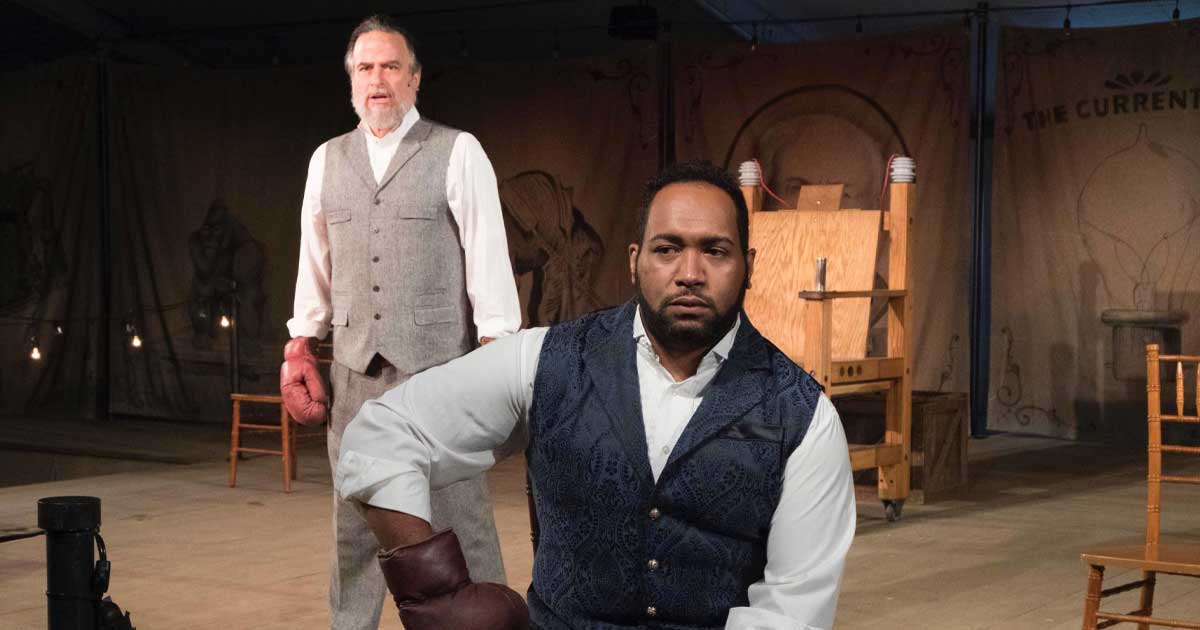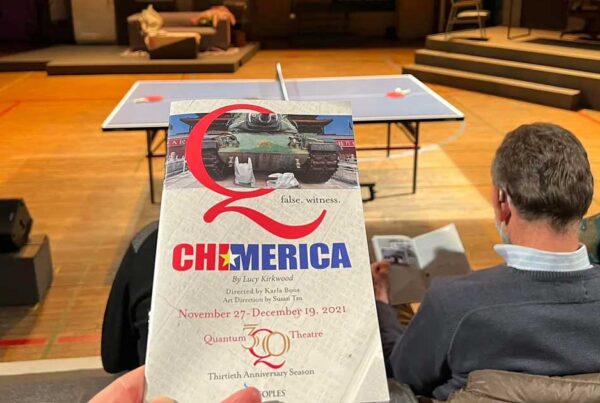
Pittsburgh Post-Gazette – On the night before his first class at the Yale University School of Drama, Michael Mitnick was writing a scene featuring two famous inventors locked in a cutthroat competition over whose version of electricity would dominate the world.
Think of it as the Gilded Age version of Mark Zuckerberg vs. the Winklevoss twins.
“The head of the program asked us to bring in a scene that featured a character from history. My mind flashed to Thomas Edison. We saw his laboratory and home in New Jersey,” said Mitnick, a Fox Chapel High School graduate, playwright, songwriter and screenwriter.
His musical, “The Current War,” features Edison’s fight with inventor George Westinghouse over direct vs. alternating current. A 2017 movie version starred Benedict Cumberbatch as Edison.
Mitnick said he was “completely flabbergasted” that Quantum Theatre wanted to present the musical version of “The Current War” in Westinghouse Park, a North Point Breeze venue where the inventor’s mansion, Solitude, once stood. It opens Friday and continues through June 27. All shows are sold out but they are accepting names for a wait list. Also, video on demand tickets will be available soon for $20 each.
“I had worked on this, certainly the story, mostly as a movie. I had not looked at it since 2011. I tried to do a better version of it with cuts and changes and sent it to them,” he said in a telephone interview.
Quantum founder Karla Boos, director Tomé Cousin and music director Douglas Levine preferred the original version.
“I’ve given them a lot of license to edit it. I would like it to be done in 90 minutes,” Mitnick said.
When he set out to write the musical, Mitnick thoroughly researched the conflict between inventors.
“Edison created the first system of electricity application distribution. It didn’t work very well and it was super expensive,” he said.
Westinghouse suggested that Edison change the voltage, put the electricity in a transformer and step down the current. Instead of partnering with him, Edison’s response was, “Maybe I’ll destroy you,” Mitnick said.
The story’s heart, he said, is “how a brilliant scientist who was already the most famous person in the entire world, who wasn’t royalty, could allow himself to such levels as lying about science in order to win.”
Edison’s attempts to undermine Westinghouse included sending his employees throughout America to convince leaders of major cities that it was more dangerous to buy Westinghouse’s alternating current than the New Jersey-based inventor’s direct current.
“Edison was involved with the creation of the electric chair. That’s what the musical is about,” Mitnick said, adding that the inventor used the execution device in an orchestrated campaign to smear Westinghouse’s version of electricity.
The two men were remarkably similar in some ways. Edison and Westinghouse both met their first wives on trains, dropped out of Union College and were self-made entrepreneurs.
“The addition of electricity … allowed them to see new possibilities that couldn’t be dreamed of,” Mitnick said.
Westinghouse was Edison’s temperamental and polar opposite, according to the writer.
“He was a self-made guy. Westinghouse just cared that his company did good things. He paid a living wage,” Mitnick said. “He was proud of winning the war of the currents.”
The often uncredited star of this tale is Nikola Tesla, the eccentric Serbian genius, who, Mitnick said, “was light years ahead of all of them. He was not a businessman. He was preyed upon because he was an immigrant.”
At first, Tesla worked for Edison, then partnered with Westinghouse.
“The brilliance was that Tesla figured out how to make a motor work with alternating current. Tesla became a multimillionaire.”
In Tesla’s memoir, Mitnick noted, he calls Westinghouse the finest man that he ever knew and “his great friend.”
The music of “The Current War” is “all based on music from the Civil War through the birth of ragtime bordering on jazz,” Mitnick said. “A waltz that opens the musical is in the style of Stephen Foster.”
A song about the night William Kemmler got drunk and killed his girlfriend with an ax is written in the style of John Kander and Fred Ebb, Mitnick said. The duo’s sly melodies for movie musicals like “Cabaret” and “Chicago” “are presumably about one thing but are actually about something totally different.”




